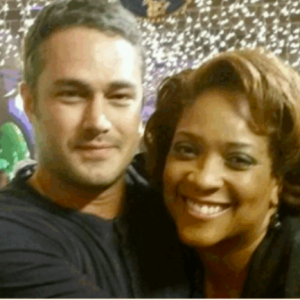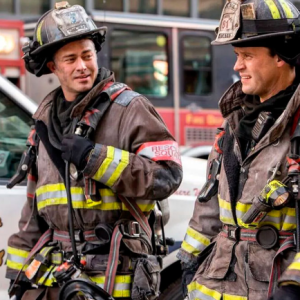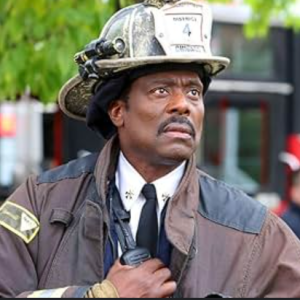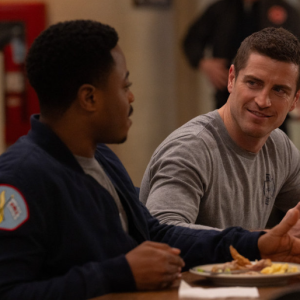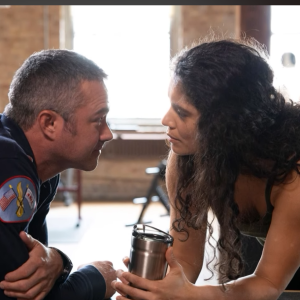On Chicago Fire, the audience is not just witnessing high-octane emergencies, but rather entering the personal and professional lives of the men and women who dedicate themselves to protecting the Windy City. Since its creation by Dick Wolf, the series has ignited what fans now know as the One Chicago universe, spawning successful spin-offs like Chicago P.D. and Chicago Med. Yet even within this interconnected television world, the flagship show retains a singular power: it is where the franchise began, and it remains the emotional anchor of the saga. With the return of Chicago Fire for its 11th season, questions about timing, cast changes, and narrative stakes have electrified its community of fans. NBC has now confirmed the official release date: Wednesday, October 1, at 9/8c. On this night, Firehouse 51’s story continues in its familiar slot, nestled between Chicago Med at 8/7c and Chicago P.D. at 10/9c, creating a dramatic trifecta that will once again dominate Wednesday evenings. And for those who prefer streaming, each new episode will be available the following day on Peacock, making midweek television a ritual for fans eager to reconnect with their favorite heroes.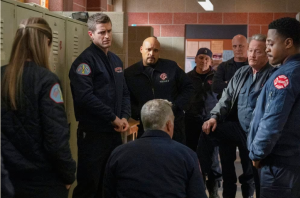
Season 11 is not simply a return—it is a test of continuity, loyalty, and evolution. At the center of the comeback stands Taylor Kinney’s Lieutenant Kelly Severide, a constant since the very first episode, whose presence reassures long-time viewers. Severide embodies the heart of the series: flawed, passionate, endlessly committed to his team and the city he serves. His return is both a narrative necessity and a gift to the fans who have followed his arc across the years. Yet as with every season of Chicago Fire, the joy of reunion is paired with the sting of farewell. The show thrives on change as much as it does on tradition, and this season, departures carry as much weight as arrivals. The steady flame of the firehouse is never static; it flickers, adapts, and reshapes itself, testing the endurance of both characters and fans.
Among the most talked-about changes is the fate of Darren Ritter, brought to life by Daniel Kyri. While Kyri will appear briefly in Season 14 to provide a dignified farewell, Season 11 represents the beginning of his slow fade from the ensemble. Ritter has been a grounding force, not just another firefighter, but a symbol of compassion, courage, and representation. His character opened space for conversations about identity and inclusion in ways that felt natural to the narrative, not forced. His absence, whether by transfer or more tragic means, will inevitably reshape the chemistry of Firehouse 51. Fans, already aware of his eventual departure, watch Season 11 with a bittersweet awareness, knowing that every appearance carries the weight of impending loss. It is a dramatic tension that hangs over the season like smoke after a blaze, infusing even routine moments with emotional charge.
But where some characters exit, others arrive, ensuring that the lifeblood of the series continues to flow. Brandon Larracuente, joining in an as-yet-unannounced role, steps into a story world where no character remains peripheral for long. In Chicago Fire, newcomers are tested by fire—both literally and figuratively. They must earn trust, forge bonds, and carry their share of the weight in a team where ever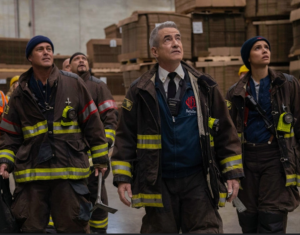 y second matters and every call could mean life or death. The introduction of a new face is not merely a plot point but an injection of fresh energy, a shift in rhythm that reverberates throughout the entire cast. For the audience, it is an invitation to fall in love again, to extend loyalty beyond the familiar and into the unknown. This delicate balance—between old and new, between what is lost and what is gained—is what has allowed Chicago Fire to endure and evolve for over a decade.
y second matters and every call could mean life or death. The introduction of a new face is not merely a plot point but an injection of fresh energy, a shift in rhythm that reverberates throughout the entire cast. For the audience, it is an invitation to fall in love again, to extend loyalty beyond the familiar and into the unknown. This delicate balance—between old and new, between what is lost and what is gained—is what has allowed Chicago Fire to endure and evolve for over a decade.
As October 1 approaches, anticipation builds not only for the next blaze or daring rescue, but for the quiet, human moments that have always been the soul of the show. Chicago Fire Season 11 promises more than action; it promises drama laced with vulnerability, camaraderie forged in crisis, and the kind of storytelling that acknowledges both the fragility and resilience of its characters. It is this blend of spectacle and intimacy that has kept viewers devoted for over ten years, turning each Wednesday night into a ritual of adrenaline and empathy. With Severide’s steadfast leadership, Ritter’s looming farewell, and a new generation stepping into the flames, the series stands at a crossroads, ready once again to redefine itself without losing the fire that first captured hearts. The sirens are ready to wail, the engines prepared to roll, and the station doors to open—Chicago Fire Season 11 is about to burn brighter than ever.
